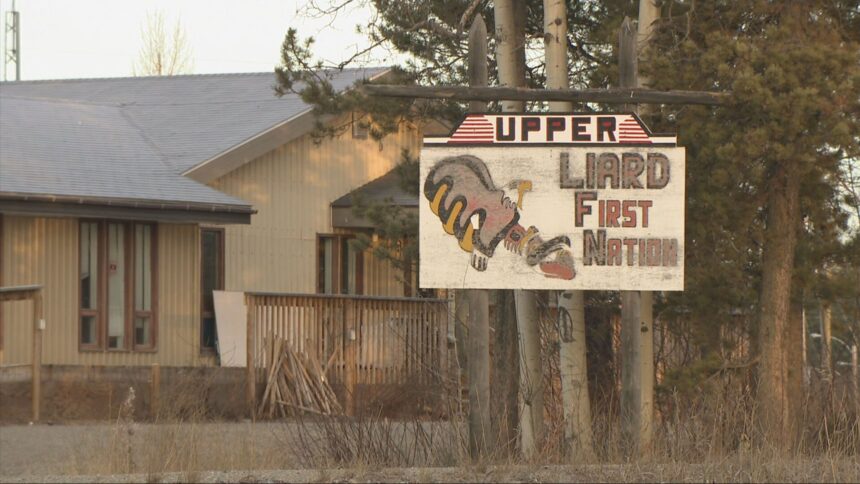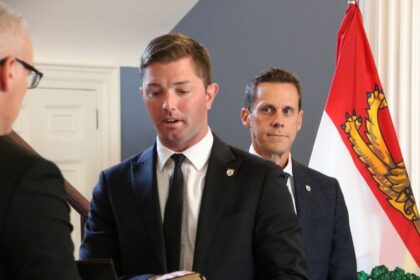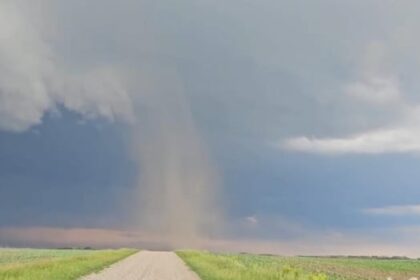The federal government threatened to “turn off the taps” on the Liard First Nation’s funding earlier this year after the band failed to file multiple financial reports and audits spanning several years, APTN National News has learned. According to a firm hired to assist the band with its finances, it failed to file 103 financial reports with the federal government, as well as six audits between 2019 to 2024, resulting in the government withholding $5.2 million in funding. Liard’s financial situation was revealed at a membership meeting at the end of January. An audio recording of the meeting was recently provided to APTN by a band member who was in attendance. Deputy Chief Harlan Schilling, who attended the meeting, told APTN he became aware of Liard’s financial situation along with membership. He’s accusing Chief Stephen Charlie of keeping the band in the dark about its own finances. Schilling said he’s been pressing Charlie for information about the band’s finances for years but hasn’t gotten anywhere. He said Charlie refuses to hold council meetings or share information with himself and other councillors who are vocal in their opposition to his leadership. “It’s a closed door with our own nation’s finances,” he said. “These are things that you shouldn’t be – as an elected official for the First Nation – finding out at a meeting.” Schilling isn’t alone. Councillor Catherine Porter also attended the meeting. She said the band’s financial situation was news to her as there’s been “absolutely no communication” from Charlie about the issue. “It’s not okay, it’s not right,” she said. Charlie was first elected in June 2020 and re-elected in June 2023. While the unsubmitted reports and audits predate Charlie’s leadership by two years, Schilling and Porter said Charlie refused to share Liard’s financial information with other members of council up until the January meeting – and he hasn’t shared any information since. “It makes it really hard when you have one person who’s supposed to be on the team that just refuses to work with you,” Schilling said. Charlie said in an email to APTN that the allegations against him are nothing new and declined to comment further. Liard First Nation Chief Stephen Charlie. Photo: Facebook CIRNAC threatened to ‘turn off taps’ on First Nation The financial meeting, which was held Jan. 27, was led Tyler Rice, founding partner of Rice & Co, an accounting firm with offices in British Columbia and Alberta. Rice was appointed as the First Nation’s acting chief financial officer in order to assist it with audit preparation. The First Nation’s funding agreements with the federal government requires it to submit audited financial statements. Rice said the federal government instructed the First Nation to work with an accounting firm in order to get its financial reporting on track. He said in the meeting that the federal government was withholding $2.7 million in program funding and $2.5 million in unallocated social assistance funds, though it continued to release general funding. Rice told those gathered that it’s typical for ISC and CIRNAC to withhold funding for a program until its delivered. He said the withheld funding isn’t a debt, but rather money that belongs to the First Nation that its entitled to collect. He also noted the First Nation had overspent on social assistance. He said in the meeting that CIRNAC entered into a comprehensive funding agreement with the First Nation in 2020 which contains 80 per cent of its core funding, despite the fact it couldn’t produce any audits the two years prior, something he said “enabled” the situation. He said the First Nation filed its 2018 audit in February 2024 – six years after the fiscal period ended – in order to extend the agreement for another year. Rice also noted that auditors found that the 2018 audit, which he said should have been completed by a previous council, was missing several areas of information, such as an opening balance and comparative figures. He said an audit process for 2019 to 2024 needs to be completed before the First Nation can submit its financial reports and collect its outstanding funding. “We’re at the point with CIRNAC where they’re saying ‘we’re going to turn off the taps because there’s 103 reports overdue and no audits,’” he said. A spokesperson for Crown-Indigenous Relations and Northern Affairs Canada (CIRNAC) and Indigenous Services Canada (ISC) confirmed in an email to APTN that the First Nation’s financial reporting is not current. Membership unhappy with chief’s leadership say councillors The First Nation, located in the community of Watson Lake in southern Yukon near the British Columbia border, has roughly 1,400 members. The band’s structure consists of a chief and four councillors for Liard, as well as a deputy chief and two councillors for the Daylu Dena Council, which is a sub-council of Liard based in Lower Post in northern B.C. For months, Charlie’s leadership has been called into question by other council members and membership. The issue culminated in a community meeting in December where roughly 100 band members in attendance voted in favor of suspending Charlie from his role. At the same time, Dene Ā́ʼ Nezen, a grassroots group of LFN members who want leadership to be accountable, likewise began circulating a petition aimed at ousting him. But Charlie said in a statement the meeting wasn’t sanctioned by LFN – nor did membership have the authority to remove him. In March, five of the First Nation’s councillors accused Charlie of attempting to pass a band council resolution that would allow him to use band resources to pay a legal retainer for his sister and fellow council member Susan Magun’s partner. Schilling said efforts to remove Charlie have not yet been successful and he continues to serve as chief – something he said isn’t sitting will with many band members. Recently, several stickers have also appeared on stop sings in the community with the phrase “(stop) Stephen Charlie.” “The people have been very clear that they’re not happy with this leadership,” Porter said. A stop sign with a sticker stating “(stop) Stephen Charlie.” Photo: Submited by Emeral Poppe ‘Money comes in, money goes out – you have to report on it’ Despite the numerous allegations against him, Charlie said in a statement posted to social media following the December community meeting that he is committed to “proper fiscal management, transparency and accountability.” Rice said things like high turnover in the First Nation’s finance department and lapsed reporting requirements during the COVID-19 pandemic contributed to the band falling behind on submitting its financial information. He also said there was a “disconnect” after the First Nation came out of third-party management. The band was put into third party by the federal government from 2014 to 2018 after it raked up more than $700,000 in debt and failed to follow the Federal First Nations Transparency Act. Rice said a federally appointed recipient-appointed advisor, which the First Nation had to contract as part of its management plan to address the debt and prevent its reoccurrence, likewise experienced high turnover, creating further challenges with reporting. Rice noted his firm would implement several measures to help the First Nation improve its financial accountability, including bringing in a modern accounting system and proposing a strategy to the federal government in order for it to become compliant with audits and reports. He said the First Nation could expect to get half of the uncollected social assistance back by the end of March, totaling roughly $1.2 million. Charlie said at the meeting the firm’s work would help lead the First Nation “in the right direction.” “I want us to move forward with transparency on all numbers,” he said. “I really believe that once we get back this money that is outstanding…we get our new budget, we look at work planning, we come up with numbers from 2018, I think that we’ll be able to move forward.” But Schilling feels differently. “Money comes in, money goes out – you have to report on it. If we could do it 23 kilometers south of their office at Daylu Dena Council, there’s no excuse why they can’t,” he said. Liard’s Deputy Chief, Harlan Schilling, has long been vocal about his opposition to Chief Stephen Charlie’s leadership. Photo: Jordan Haslbeck/APTN. Porter agrees. “It’s been a difficult four and a half years working under Chief Charlie’s tenure, and these challenges we are facing happen under his leadership…there’s no excuse for that,” she said. Porter likewise said the meeting ultimately left her with more questions than answers. “I found myself grappling with several points of the discussion that seemed deliberately vague,” she said. “There were instances where questions went unanswered, which contributed to an overall sense of confusion among myself and, most importantly, the members that attended.” Diana Lee Jimmy, a LFN member who was also attendance at the January meeting, said no financial reports were provided to membership. “I feel like there’s a lack of transparency there,” she said. Deputy chief decries lack of general assemblies, has doubts about First Nations Management Act Rice said plans were also underway to implement the First Nations Fiscal Management Act (FMA), something Charlie said in a December statement had never been done before in the First Nation’s history. The FMA is an optional law that provides First Nations with support and tools to strengthen accountability and their economies. The act provides First Nations with the authority to pass by-laws related to financial administration and taxation of land under the Indian Act. It also requires First Nations to follow good governance and finance practices, as well as be in good financial health. Rice said the law would come into effect once it’s ratified at a general assembly, or GA. He also noted it would take time to go through the First Nation’s financial information before it could be shared with membership. “We’re trying to do six years of work in six months. It’s hard to convey the magnitude of the project that we’re consuming from the financial detail that we’re going through to just prepare that information for an audit,” he said. But Schilling and Porter doubt the law will come into effect under Charlie’s leadership. They claim Charlie refuses to work with other members of council to hold a GA, with only one being held in the nearly five years he’s been chief. Schilling said the last GA was held in October 2022. “It, from what we can see from the outside looking in, has just gotten worse,” he said. “This is very, very concerning.” Several members who attended the January meeting also raised concerns about the lack of general assemblies. They noted the last GA did not include any information about the First Nation’s finances. But Charlie said at the meeting “there wasn’t any financials to report on” at the time and indicated a GA hadn’t been held since then because of a lack of financial information. “We looked at the financials last year, and it wasn’t worth even meeting on,” he said. We will have a GA this year, when we decide that leadership wants to have a GA, and we have something to report on.” But Lee Jimmy disagrees. “There’s so much more reason to have an (annual general assembly) than just finances. It is a fundamental part of transparency and accountable governance,” she said. “Members have a voice and guide leadership, because that’s really what it’s supposed to be.” Porter feels there’s no excuse to not hold a GA. “We are elected officials for our nation, and we hold fiduciary duty, and that includes financial management, and all I see is excuses and financial neglect,” she said. “And the people who suffer is our members, unfortunately.” Schilling said with no plans for a GA in the near future, Daylu Dena Council is planning to hold its own GA in June where LFN members are encouraged to attend. “That is our opportunity to report out what we’ve done with the government’s money,” he said. At the end of the day, Schilling said he simply wants all of council to be able to work together. “I would like for my First Nation to finally be out of out of the muddy waters. I would like to see some governance structure put in place again,” he said. LFN is expected to hold a community meeting on Apr. 25. Continue Reading
Feds threatened to squeeze funding from Liard First Nation over lack of financial reports, audits

Leave a Comment









